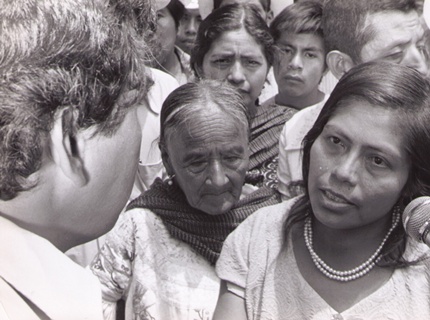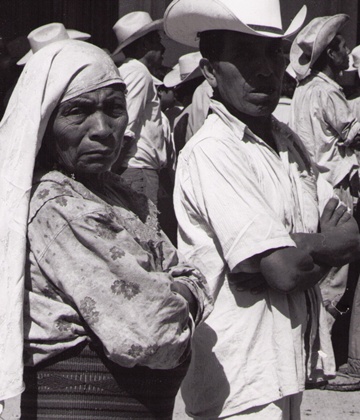COFFEE GROWERS BREW UP A
REVOLUTION
By Rosa Jordan
Los Angeles
Times, Sunday,
July 27, 1975
I have no great love for
revolutions; Latin America for me is a place for vacations. Yet a few
times I’ve rushed against dramatic political change—in Argentina
when Peron returned to power, in Peru as an unwilling target in a
riot, in Chile the week before Allende died.
And so
I think I’d know
the makings of a revolution if I saw it. The ingredients were there
in a most unlikely place this summer, as I hitch-hiked alone through
the jungles of southern Mexico. The elements were poor, deprived
peasants, some innovative officials planning an international
sellers’ “cooperative,” and a commodity that suddenly is in the
news—coffee.
It was
at the Mayan ruins
of Palenque that I met Mexico’s President Luis Echeverria, who has
pledged to take his government to the people as part of his “politics
of dialogue.” And Echeverria introduced me to Fausto Caņtu
Peņa,
director of the Instituto Mexicano del Café—Mexico’s
coffee institute.
I did
not take Caņtu Peņa
at first for a revolutionary, with his year at Harvard, his
diplomatically-controlled impatience, his tired, restless eyes. But I
soon learned of his campaign to improve the lot of his people.
 In San
Cristobal de las
Casas, a ragged Indian woman rushed from the mountain village crowd,
grabbed Caņtu Peņa’s hand, and tried to kiss it. He stopped
her,
and embraced her. “How old are you, mother? How many children do
you have?” She thought she was about eighty; she’d had many
children but only two survived. While she talked, he took all the
bills from his wallet—several hundred pesos—and discreetly gave
them to her.
In San
Cristobal de las
Casas, a ragged Indian woman rushed from the mountain village crowd,
grabbed Caņtu Peņa’s hand, and tried to kiss it. He stopped
her,
and embraced her. “How old are you, mother? How many children do
you have?” She thought she was about eighty; she’d had many
children but only two survived. While she talked, he took all the
bills from his wallet—several hundred pesos—and discreetly gave
them to her.
Later
I remarked on his
compassion. He shrugged. “What is it to help one for a short time?”
Chiapas is an agricultural area. The main crop is coffee. Most of it
is grown by farmers with fewer than ten acres, fewer, even than two
acres. They are thousands, living on less than a thousand dollars a
year. When I’ve helped them all, I’ve done something worthwhile.”
“Wouldn’t that take a
revolution?”
“Yes,”
he replied.
“We’re making one.”
“Really? Against whom?”
“Fat
ones, dometic and
international, who oppress these people and make it impossible for
them to earn a decent livelihood, no matter how hard they work.”
“Show
me your
revolution,” I challenged.
Despite land reforms
which have broken up large plantations, big landowners, because they
have organization and marketing expertise, still control the agrarian
economy. What do the thousands of campesinos do, each with the few
bags of coffee they’ve grown? They sell it, for a nickel a pound,
to men with the capital to build processing plants. The coffee is
quickly processed—now worth 20 cents a pound—and exported. That’s
where the real money is made. As usual, men who work longest and
hardest receive least, while those who already have capital, plus the
skill of buying low and selling high, earn most.
The town of
Tapachula was celebrating the opening of Conasupo when we arrived.
I’d seen Conasupos in many villages, but did not understand their
purpose.
“They’re
government-sponsored cooperatives,” explained an employee.
Formerly, campesinos were forced to sell their products to middlemen,
who took advantage of them in order to maximize their own profits.
Now they can sell to Conasupo, which exports for them. They receive
guaranteed minimum prices, so if world prices are low, they don’t
starve. If prices are high, profits don’t go into the pocket of one
man, but are distributed among the campesinos.
But a
campesino receives
only a nickel for a pound of unprocessed coffee, whereas processed
coffee is worth twenty cents. “What about processing?” I ask.
“Conasupo doesn’t do that, and an individual can’t do it for
himself.”
“Collectively he can,
and we’re encouraging him to do so,” says Caņtu Peņa. “Go into
the jungles and see for yourself what’s been built there.”
Through comic-book-type
literature, campesinos are being shown how to build
cooperatively-owned processing plants in their own communities. Money
and technical assistance can be obtained from the government if the
people will contribute labor and materials available in the region.
Three years ago, 15 such processing plants existed. Now there are
203.
That
sounds good, but
it’s not impressive when compared with the need. Cooperation comes
slowly when campesinos are mistrustful of a government which for
generations has taken advantage of them.
I
visited an experimental
camp where information to improve production was being disseminated
to the people by classes held at the camp, and by technical
assistance teams going into the countryside.
A
meeting, held at the
people’s demand, was packed with several thousand students,
teachers, women, children, campesinos.
 Government officials
began to speak. Some were applauded. Some were not. A campesino took
the podium. “You’ve given us land, but what good is land without
seeds? He complained. “You teach us which fertilizer is best, but
we haven’t money to buy it. You pay a guaranteed minimum price for
our coffee, but the minimum isn’t enough.”
Government officials
began to speak. Some were applauded. Some were not. A campesino took
the podium. “You’ve given us land, but what good is land without
seeds? He complained. “You teach us which fertilizer is best, but
we haven’t money to buy it. You pay a guaranteed minimum price for
our coffee, but the minimum isn’t enough.”
Another farmer, in
rough clothes and mud-caked shoes, shouted, “When we take our
coffee to Conasupo, sometimes we’re told you haven’t enough money
to buy it. We’re forced to sell to coyotes (middlemen) for less.
There’s corruption—you and you and you—“ He points and names
three officials in the second and third rows, “are corrupt and
should be removed. And you—” He points to Caņtu
Peņa. “You’ve
made promises you haven’t kept!”
Caņtu
Peņa goes to the
podium. “It’s true,” he says simply. “Sometimes we haven’t
had enough money to buy all your crops. The minimum price isn’t
enough, and you need more technical assistance. But you’re getting
twice as much assistance as two years ago. You’ve received forty
million pesos from the government to build your own processing plant.
Your income is five times greater than it was five years ago.”
The
people, hostile at
first, now lean forward, unfold their arms, seem to accept. He
continues.
“Today
I talked to the
president of Guatemala about ways our countries can cooperate to
obtain beter prices in the international market. Tomorrow I’ll got
to El Salvador for a meeting with other coffee-producing countries to
discuss the same thing. We’re trying there, we’re trying here.
This is my phone number in Mexico City. If you feel someone in this
organization is corrupt, call me and there will be an investigation.
But I can’t always be your policeman. You must organize.”
Caņtu
Peņa is working to
build a new cooperative society. But old exploiters still exist, and
perhaps future governments will be on their side.
“But
why doesn’t the
government give them more now?” I asked. “Some have land without
water. They lack capital and technical assistance. They need those
things today.”
“Campesinos need
money to develop their lands, but what about the urban poor?” an
architect interrupts. “We need a hundred thousand houses a year for
slum dwellers in Mexico City but can afford only fifty thousand. And
half of Mexico’s population is under eighteen. Do you realize how
much we must spend on education? There’s only so much money. When
it’s gone, whether well-spent or wasted, where do we get more?
We’re not a rich country.”
“We’re
rich in
resources,” says Caņtu Peņa. “But consumer nations don’t pay a
fair price for our raw materials.”
“What
do you call a
fair price?” I ask.
“That
same that would
be considered fair for manufactured items—a price that covers the
cost of production and allows the man who produces it a decent
livelihood.”
No reminder is
needed of the injustice which developed nations have perpetrated for
generations upon people of the Third World who produce, coffee,
chocolate, sugar, tropical fruits. In North America, bananas can be
bought for twenty cents a pound because a man in Guatemala works for
twenty cents an hour; coffee for less than two dollars because a man
in Chiapas works for less than two dollars a day. To observe the life
of an agricultural worker in any Third World country is to know that
those luxuries are enjoyed at the expense of his well-being.
“You’re not strong
enough to force rich countries to pay you a reasonable price,” I
say. “They’ve always paid what they choose to pay, no more.”
To
which Caņtu Peņa
replies, “Small countries, like small farmers, must unite and form
marketing cooperatives. Together they’ll be able to demand
reasonable prices for their products. The rich stop taking from the
poor when the poor are strong enough to resist."
It is
not an easy thing
because small countries, like small farmers, aren’t accustomed to
power.
But
times change, and the
time when the rich can make every decision has passed. This is a time
when oppressed countries and oppressed people, by uniting, are
becoming strong enough to take what’s rightfully theirs. This is
the revolution.
 In San
Cristobal de las
Casas, a ragged Indian woman rushed from the mountain village crowd,
grabbed Caņtu Peņa’s hand, and tried to kiss it. He stopped
her,
and embraced her. “How old are you, mother? How many children do
you have?” She thought she was about eighty; she’d had many
children but only two survived. While she talked, he took all the
bills from his wallet—several hundred pesos—and discreetly gave
them to her.
In San
Cristobal de las
Casas, a ragged Indian woman rushed from the mountain village crowd,
grabbed Caņtu Peņa’s hand, and tried to kiss it. He stopped
her,
and embraced her. “How old are you, mother? How many children do
you have?” She thought she was about eighty; she’d had many
children but only two survived. While she talked, he took all the
bills from his wallet—several hundred pesos—and discreetly gave
them to her. Government officials
began to speak. Some were applauded. Some were not. A campesino took
the podium. “You’ve given us land, but what good is land without
seeds? He complained. “You teach us which fertilizer is best, but
we haven’t money to buy it. You pay a guaranteed minimum price for
our coffee, but the minimum isn’t enough.”
Government officials
began to speak. Some were applauded. Some were not. A campesino took
the podium. “You’ve given us land, but what good is land without
seeds? He complained. “You teach us which fertilizer is best, but
we haven’t money to buy it. You pay a guaranteed minimum price for
our coffee, but the minimum isn’t enough.”